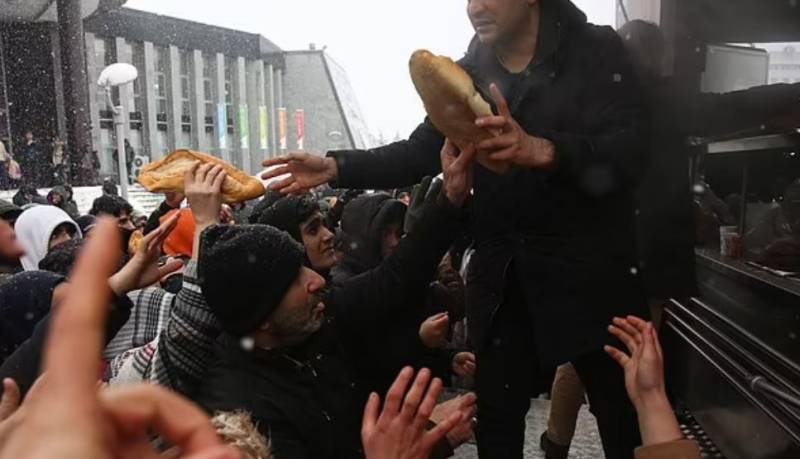Many Turkey quake victims hungry as winter hampers aid efforts

Stay tuned with 24 News HD Android App

In the Turkish city of Sanliurfa, survivors of the massive quake that has wreaked death, destruction and havoc on the region face an invisible but powerful threat -- hunger.
As the morning sun illuminates the sky, Sanliurfa's cracked streets look empty. The mercury is only just above freezing, but it feels much colder. Like their neighbours in the other nine provinces hit by Monday's 7.8-magnitude quake and its frightening aftershocks, the people of Sanliurfa are focused on basic survival.
Turkey's most powerful quake in almost 100 years had struck this remote border region with Syria in the early hours on Monday, killing more than 5,000 people in Turkey and neighbouring Syria. Dozens of Sanliurfa families found refuge in the imposing Hilton hotel's ground floor.
Early on Tuesday, most of the parents huddling with their children have not slept a wink.

"We arrived here at 3:00 pm yesterday, the hotel gave us soup in the evening, but the night has passed. We're hungry, and the children too," said Imam Caglar, 42.
"The bakeries will be closed today, I don't know how we will find bread," the father of three said.
It's out of the question to go fetch food from his flat, located a few streets away, because of the danger that the building might suddenly crumble.
"We live on the first floor out of three, we're too scared to return," he says, shaking his head. "Our building is not safe at all."
The Turkish government is scrambling to house people forced into the street after their homes either collapsed or were too risky to stay in because of the aftershocks.
Hundreds of thousands spent the night in dormitories, schools, mosques and other public buildings, while others sheltered in hotels that opened their doors for free.
Supplying them with food and other basic aid has been a challenge.
A winter storm has made the region's roads, some of them heavily damaged by the tremors, nearly impassable. Many local airports are shut, their runways in need of repair.
"We had a small bowl of soup, that's not enough," says Mehmet Cilde, 56, a father of six. He hopes that the local municipality will eventually provide food. But, he admits, "we have no information, nothing".
The situation is even more dire for Filiz Cifci. She missed the soup distribution on Monday evening, further along the street from the Hilton hotel.
Cifci and her three children, who fled their home before dawn Monday with only their three blankets and phones, preferred to skip a meal than wait in the wind and cold rain. "We only had tea and coffee yesterday evening, nothing else," she said, in a headscarf and purple tunic, sitting close to the hotel's bathroom, where families get drinking water. She doesn't know if her children will have enough to eat on Tuesday and in the coming days.
"For now we have nothing but our blankets," she said. She paused, then added: "At least here, the water is drinkable." Event overview maps show that potentially 23 million people are exposed, including around five million vulnerable populations," the World Health Organization's senior emergencies officer Adelheid Marschang said.
"Civilian infrastructure and potentially health infrastructure have been damaged across the affected region, mainly in Turkey and northwest Syria," she said.
The WHO "considers that the main unmet needs may be in Syria in the immediate and mid-term," Marschang told the WHO's executive committee in Geneva.
She spoke as rescuers in Turkey and Syria braved freezing cold, aftershocks and collapsing buildings, as they dug for survivors buried by a string of earthquakes that killed more than 5,000 people. "It is now a race against time," said WHO chief Tedros Adhanom Ghebreyesus, explaining that the UN health agency was urgently sending aid to the area.
"We're mobilising emergency supplies and we have activated the WHO network of emergency medical teams to provide essential health care for the injured and most vulnerable." Disaster agencies said several thousand buildings were flattened in cities across a vast Turkey-Syria border region -- pouring misery on an area already plagued by war, insurgency, refugee crises and a recent cholera outbreak.
Through the night, survivors used their bare hands to pick over the twisted ruins of multi-storey apartment blocks -- trying to save family, friends and anyone else sleeping inside when the first massive 7.8-magnitude quake struck early Monday. The situation is particularly dire in northern Syria, which has already been decimated by years of war.
"The movement of aid through the border into northwest Syria is likely to be or is already disrupted due to the damage caused by the earthquake," Marschang said.
"This in itself would be a huge crisis already." She addressed a special meeting on the tragedy, which held a minute's silence for the victims.
The WHO chief vowed that the agency would "work closely with all partners to support authorities in both countries in the critical hours and days ahead, and in the months and years to come as both countries recover and rebuild."
